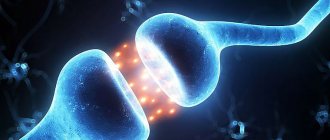Types of hormones that affect weight
There are several active substances that are produced by the internal secretion organs and are directly related to weight gain.
Here is their list:
- leptin;
- ghrelin;
- estrogens;
- cortisol;
- adrenalin;
- testosterone;
- insulin;
- thyroid hormones (thyroid).
Leptin
It is synthesized by fat cells (adipocytes) and determines the feeling of satiety. Transmits a signal to the hypothalamus about the amount of body fat and body weight. As a result, the brain centers responsible for appetite are activated. An increase in its level leads to increased heart rate, increased blood pressure and the process of thermoregulation. Low leptin concentrations are accompanied by menstrual irregularities.
Ghrelin
Produced by cells of the lungs, kidneys and gastrointestinal tract. Some of it is produced by the gonads and placenta. Ghrelin levels increase before meals and decrease after meals. With weight loss, the amount of hormone and the feeling of hunger increases. It has been proven that lack of sleep has a direct effect on increasing the concentration of this substance.
Cortisol
This is a steroid hormone that is produced in the adrenal glands. Controls the process of its production by ACTH (pituitary hormone), and its level is regulated by the hypothalamus (through the production of corticoliberin). Cortisol is responsible for carbohydrate metabolism and the body's response to stress.
The level of this substance depends on the time of day. It rises in the morning and falls in the evening. Many women, during psycho-emotional upheavals, experience hunger and begin to “eat up” stress precisely due to the increased release of cortisol.
Adrenalin
Produced by the adrenal medulla. The reasons for its increase are the same as for cortisol. But in this case, metabolism increases, and appetite decreases and fat breakdown occurs. Adrenaline is produced in large quantities by people involved in extreme sports.
Estrogens
These are sex hormones in women, the main part of which is produced by the ovarian follicles. An increase or decrease in estrogen levels directly affects a woman’s body weight and her general health. Weight gain during pregnancy provides a sharp jump in sex hormones. This reaction of the body helps to stock up on energy for the successful gestation of the fetus. Normally, after some time, body weight and hormonal balance return to their previous levels.
But if excess weight persists after childbirth and lactation, in this case we are talking about endocrine obesity. Disturbances in the production of such substances can also occur at other periods of life, which leads to the deposition of fat on the lower torso, legs and thighs. Therefore, estrogens and excess weight have a directly proportional relationship.
Testosterone
Produced in women in much smaller quantities than in men. Responsible for libido and helps break down fat deposits. Too high a concentration of testosterone in a woman leads to weight gain, but not due to fat, but as a result of the growth of muscle fibers.
Insulin
Produced by pancreatic cells and is responsible for normal glucose levels and its absorption by the body. A lack of the hormone leads to the conversion of sugar into fat instead of providing energy as a result of reactions.
Thyroid hormones
Insufficient production of thyroid hormones leads to decreased metabolic rate and obesity. High levels of thyroxine and other active substances promote weight loss.
Read about how to treat a broken tibia.
And here is information about what to do if your leg muscles cramp.
Useful article “How to make honey wrap for weight loss at home.”
Progesterone
Progesterone is well known for its ability to balance and optimize the effects of estrogens. With each monthly cycle, estradiol stimulates the proliferation of mammary epithelial cells and reproductive tissue cells. Progesterone, produced in the second half of the menstrual cycle, then slows estrogen-stimulated proliferation, allowing tissue specialization and differentiation. For the same reason, when studying hormones and obesity in women, progesterone is needed to balance estrogen replacement therapy to prevent overgrowth and proliferation of the uterine lining to reduce the risk of endometrial cancer.
We know that synthetic progestins are also used for this purpose, but although they are effective in suppressing endometrial proliferation, they have been found to have adverse effects in other areas, especially the cardiovascular system and breasts. Natural progesterone does not have these side effects, and actually has many beneficial effects in the body. But it is thought that these hormones and excess weight in women can contribute to weight gain or bloating. Research has shown that women tend to have an increase in appetite and food intake during the second half of their menstrual cycle, as well as during pregnancy, when progesterone levels are higher than normal. Encouraging you to eat more in preparation for pregnancy and during pregnancy makes sense from a physiological perspective, but otherwise we don't need to increase progesterone levels excessively.
Some forms of progesterone replacement therapy can lead to excessive progesterone levels, which can increase the risk of insulin resistance, which will promote fat storage rather than energy use. It is important to monitor progesterone levels, as with all hormones, while supplementing to ensure levels are within the physiological range and are well balanced with estradiol and testosterone. Bloating or weight gain may mean that too much progesterone is being used.
Tests for obesity
When there is a rapid increase in fat deposits on the hips, legs and other parts of the body in a woman, you should know what hormone tests should be taken if you are overweight. For a complete examination, you need to check the level of such substances in the blood:
- TSH. Its decrease is most often reflected in a slowdown in metabolic processes, and it also controls the production of T3 and T4. With its help, a violation of the thyroid gland is detected.
- ACTH. Shows the functioning of the adrenal glands.
- LH (luteinizing hormone) allows you to evaluate the functioning of the gonads.
- Prolactin. Helps identify endocrine system disorders in regulating fluid and electrolyte balance.
- Insulin. Its level determines the state of glucose metabolism and the energy capabilities of the whole organism.
Any blood test for weight loss is taken on an empty stomach; sometimes fluctuations in hormone levels lead to biased results. In this case, a re-examination is required.
General studies
To determine the causes of obesity and correctly draw up a treatment plan, you cannot do without general and biochemical tests.
In particular, the presence of excessive fullness requires checking the level:
- hemoglobin;
- platelets;
- cholesterol;
- ESR;
- glucose;
- bilirubin;
- urea.
For example, studies of glucose and hemoglobin can indicate diabetes mellitus, which is often present together with obesity in an active or latent phase.
Donating blood for hormones is necessary for every patient who suffers from excess weight and cannot cope with it without outside help. Thanks to proper preparation, it will be possible to obtain reliable results, which will subsequently help the doctor select the appropriate treatment.
When to see a doctor
It is important! It is not necessary to do all the tests at once, so as not to waste time and spend extra money. In order to determine the minimum required list of examinations, you need to contact a specialist.
He will study your medical history, take into account all complaints and help you figure out what hormone tests should be done if you are overweight. After receiving the results, the doctor will help interpret them and then prescribe treatment. Typically, endocrine obesity is treated by an endocrinologist.
It is not always necessary to take hormone replacement therapy, much less self-medicate . For minor deviations, it is enough to change lifestyle, switch to a low-calorie diet, stop drinking alcohol and increase physical activity.
If these methods do not lead to a positive result, then a specialist may prescribe medications necessary for weight loss. But only after it is completely clear which hormone is responsible for excess weight in a particular case. They often have side effects, so their dosage is selected individually for each person.
Why does excess weight appear?
Excess weight is usually attributed to poor nutrition and a passive lifestyle. People often talk about overweight people: they eat a lot and don’t exercise at all. However, this is not always the case. Sometimes, even on a low-calorie menu and with normal physical activity, weight correction occurs at a very slow pace or in spurts, when a person either loses a few kilograms or gains them again.
In this case, the nutritionist should consider other reasons for the client's excess weight. As a rule, you need to take an endocrinologist in tandem, although sometimes consultations with a gynecologist and a gastroenterologist may be necessary (we are not currently considering the psychological causes of obesity against the background of eating disorders).
If a nutrition consultant has completed quality courses in dietetics and acquired the necessary knowledge in endocrinology, he may not need a specialized specialist. He will prescribe all tests and examinations himself, and then develop the most effective weight correction program for his client.
Experienced nutritionists know that most often difficulties in losing weight and stabilizing body weight are caused by problems with the thyroid gland. A deficiency of thyroid hormones, called hypothyroidism, in many cases leads to an unreasonable gain of extra pounds (even against the background of a well-balanced diet).
Another important endocrine problem is type 2 diabetes mellitus, which involves persistent insulin resistance. It is also quite difficult for diabetics to get rid of their obesity without appropriate treatment and normalization of blood glucose levels.
Do not forget that dysfunction of the reproductive system, namely, an excess or lack of certain hormones, is also accompanied by excess weight. This problem is typical for women of reproductive age who have hormonal imbalances, as well as during menopause.
In this case, it is better to involve a competent gynecologist-endocrinologist in weight correction, who will prescribe the necessary hormonal therapy to normalize the condition. And only then the nutritionist will help the client lose extra pounds through proper nutrition and regular physical activity.
From all of the above, it becomes clear that before developing a weight loss program, a nutritionist or nutrition consultant should advise the client to undergo a number of tests and undergo some examinations. At our school of nutrition, we recommend doing just that.
Excess weight and hormonal imbalance
Hormonal imbalance is one of the most common causes of excess weight. Modern man is surrounded by factors that disrupt the delicate balance of hormones in the body, and is sometimes powerless against them. Failures can be caused by:
- puberty;
- pregnancy, lactation, menopause;
- emotional and physical overload;
- constant stress;
- chronic fatigue syndrome;
- promiscuous sex life;
- sleep disturbances, regular lack of sleep;
- daily shifts at work, when you have to stay awake for 24 hours straight;
- lack of daily routine;
- various diseases;
- eating in fits and starts and dry food.
The constant presence in life of 3-4 factors from this list is enough for the sides to immediately begin to acquire fat deposits, and the waist to expand literally before our eyes. At the same time, diets and exercise either do not lead to any results at all or have a short-term effect. So excess weight and hormonal levels are closely related to each other. And if the latter is not improved, the former will lead to real obesity (we talked about this disease in detail in one of our articles).
Causes of body weight gain
Obesity can be:
- primary, caused by heredity, excess nutrition, lack of exercise;
- and secondary, being a symptom of endocrine diseases.
Weight gain, especially moderate weight gain, is not always a consequence of excessive fat deposition.
- It can be caused by fluid retention in the body due to certain diseases of the kidneys, heart and other reasons.
- Therefore, to confirm the alleged diagnosis, in addition to measuring total body weight, the amount of adipose tissue in the body is determined.
What is the connection

Many people underestimate the effect of hormones on weight. And completely in vain, since it depends on them:
- metabolic rate;
- frequency and severity of hunger attacks;
- appetite control;
- adipocyte formation;
- fat burning intensity;
- thermogenesis;
- volume of muscle mass.
Hormones affect excess weight directly (promote the formation of visceral fat, increase cravings for sweets, provoke surges in blood sugar and cholesterol) and indirectly (increase stress or reduce libido, and this leads to increased appetite).
General recommendations

- You should take tests after preliminary preparation for them, about which your medical professional will inform you in detail.
- It is strictly forbidden to take tests at elevated temperatures, after drinking alcohol, or after taking medications the day before.
- Interpretation of test results and diagnostic searches are the prerogative of your doctor.
Important: independent assessment of data, just like self-medication, is unacceptable!
Therapist, Sovinskaya Elena Nikolaevna.
32, total, today
( 40 votes, average: 4.70 out of 5)
Dermatoscopy: what is this diagnostic method, how is it carried out?
Breast ductography











